北师大版(2019)选择性必修四Unit 11 Conflict And Compromise Lesson 1 Living In a Community Topic Talk 课件(61张PPT)
文档属性
| 名称 | 北师大版(2019)选择性必修四Unit 11 Conflict And Compromise Lesson 1 Living In a Community Topic Talk 课件(61张PPT) | 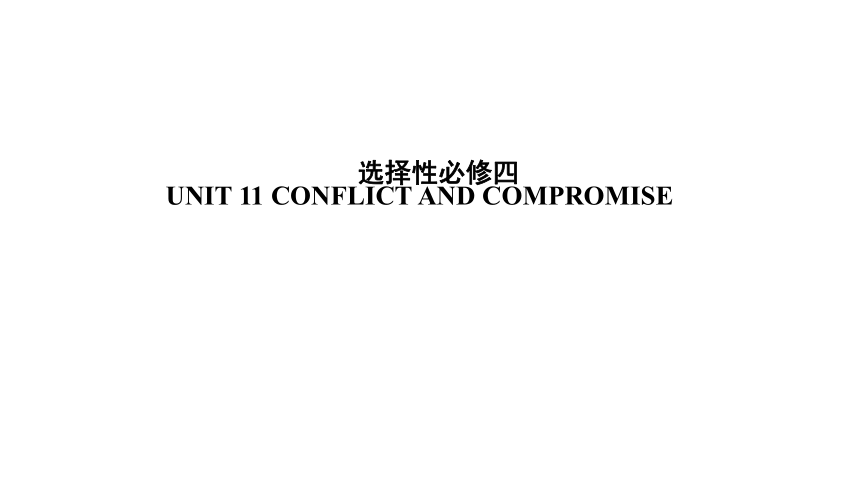 | |
| 格式 | pptx | ||
| 文件大小 | 4.6MB | ||
| 资源类型 | 教案 | ||
| 版本资源 | 北师大版(2019) | ||
| 科目 | 英语 | ||
| 更新时间 | 2022-11-05 16:35:28 | ||
图片预览


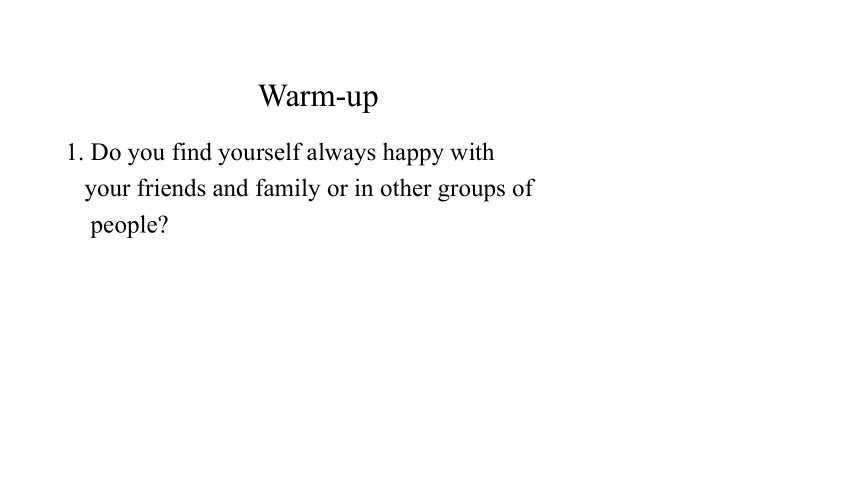
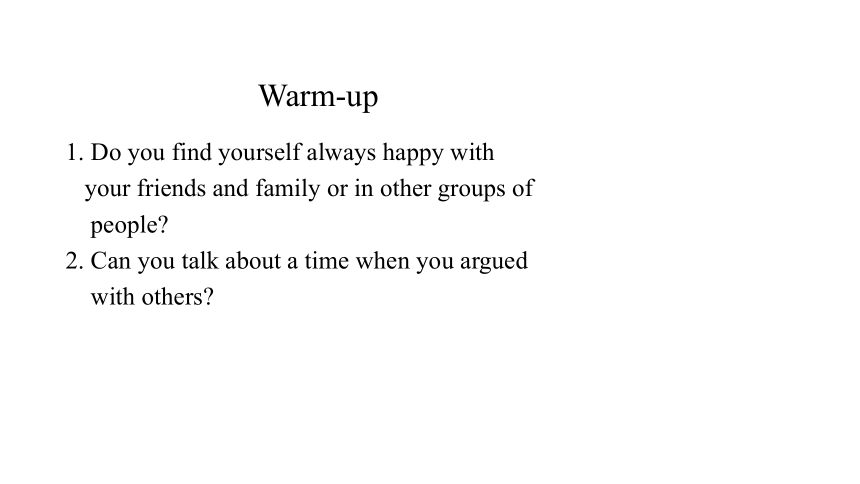
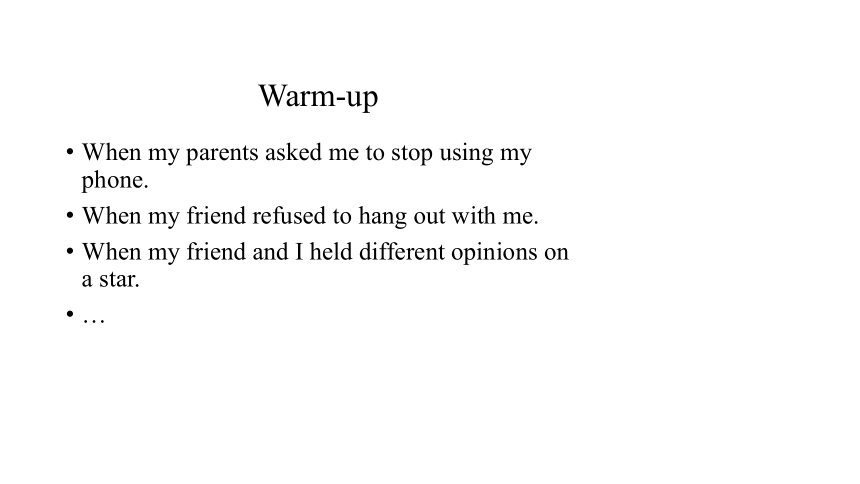

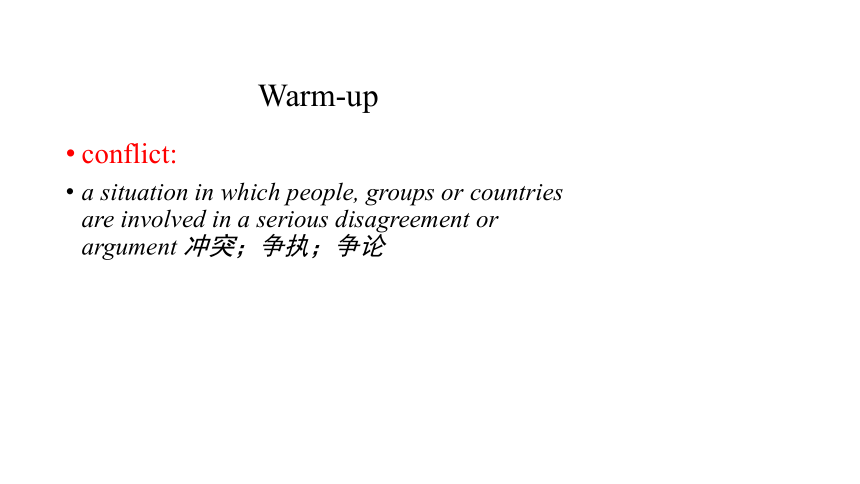

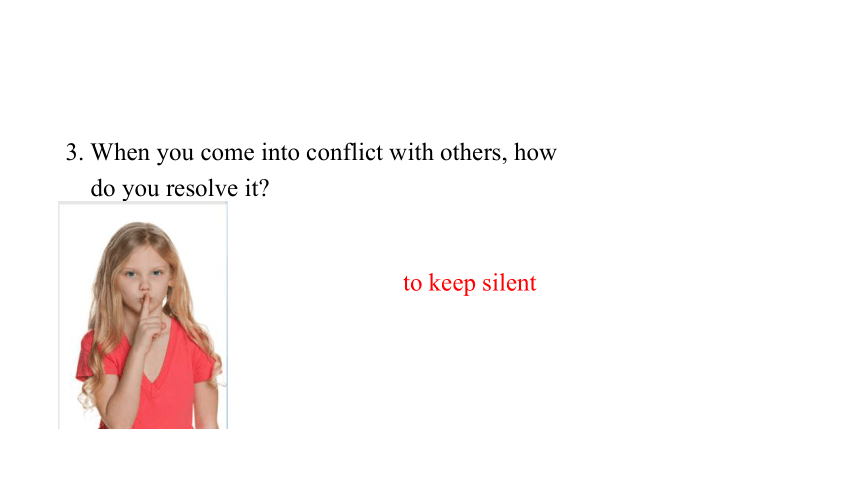

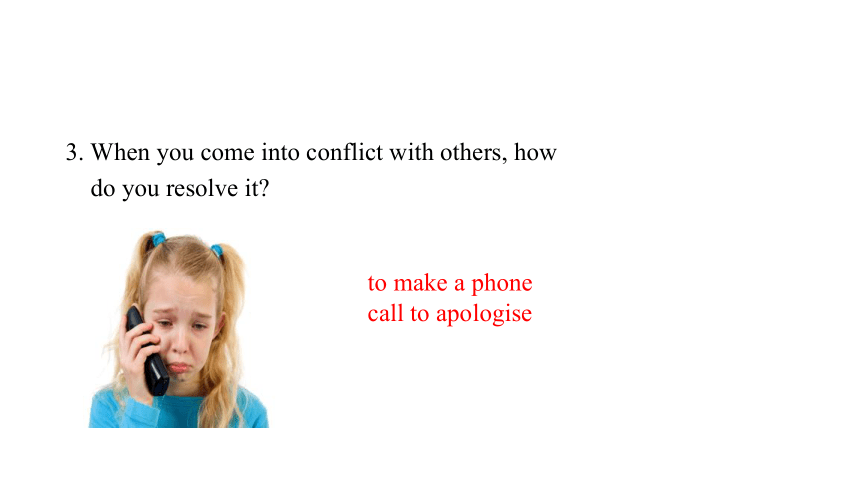
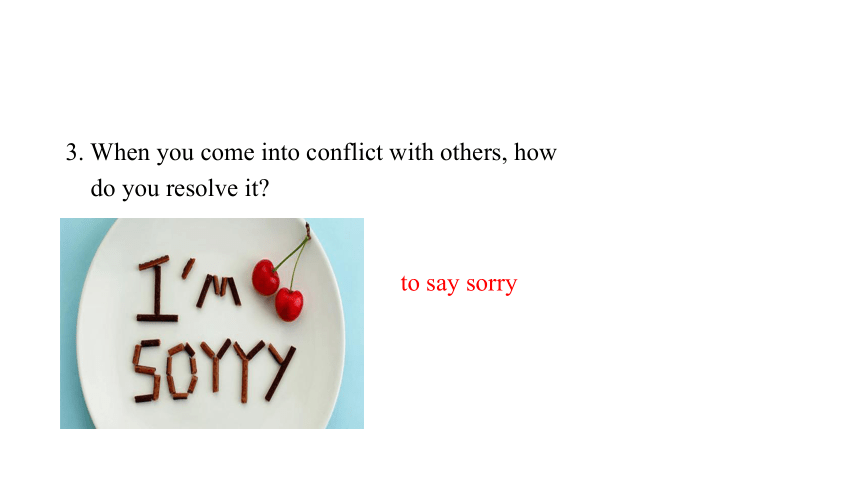
文档简介
(共61张PPT)
选择性必修四
UNIT 11 CONFLICT AND COMPROMISE (1)
TOPIC TALK
Warm-up
1. Do you find yourself always happy with
your friends and family or in other groups of
people
Warm-up
1. Do you find yourself always happy with
your friends and family or in other groups of
people
2. Can you talk about a time when you argued
with others
Warm-up
When my parents asked me to stop using my phone.
When my friend refused to hang out with me.
When my friend and I held different opinions on a star.
…
Warm-up
When my parents asked me to stop using my phone.
When my friend refused to hang out with me.
When my friend and I held different opinions on a star.
…
conflict
Warm-up
conflict:
a situation in which people, groups or countries are involved in a serious disagreement or argument 冲突;争执;争论
Warm-up
3. When you come into conflict with others, how
do you resolve it
resolve:
to find an acceptable solution to a problem or difficulty 解决(问题,争端)
3. When you come into conflict with others, how
do you resolve it
to keep silent
3. When you come into conflict with others, how
do you resolve it
to talk to my friends
3. When you come into conflict with others, how
do you resolve it
to make a phone call to apologise
3. When you come into conflict with others, how
do you resolve it
to say sorry
3. When you come into conflict with others, how
do you resolve it
to respond with more anger
to ask someone else for advice
3. When you come into conflict with others, how
do you resolve it
to negotiate with…
negotiate: to try to reach an agreement by formal discussion 协商
3. When you come into conflict with others, how
do you resolve it
to explain my idea again
3. When you come into conflict with others, how
do you resolve it
3. When you come into conflict with others, how
do you resolve it
to keep silent; to talk to my friends; to make a phone call to apologise; to say sorry; to respond with more anger; to ask someone else for advice; to negotiate with him/her; to explain my idea again
3. When you come into conflict with others, how
do you resolve it
To resolve conflicts, I often keep silent, because I don’t think it useful to explain to them.
I don’t think responding with more anger would help, but in reality I usually find it difficult to control myself.
I try to put myself in their shoes and then find a good way to resolve the conflict.
Listening 1
Listen and tell between whom the conflict happened.
Husband and wife
An agent and a customer
Colleagues
Listening 1
Listen and tell between whom the conflict happened.
Husband and wife
An agent and a customer
Colleagues
Listen again and answer the two questions.
What is the conflict
How did the customer feel at first and at last
Listening 1
Listen again and answer the two questions.
What is the conflict
The customer paid his account in full but was asked to pay again and again, otherwise his account would be closed.
Listening 1
Listen again and answer the two questions.
How did the customer feel at first and at last
He felt angry at first, but satisfied at last, because the issue was properly resolved. Besides, he felt sorry because of his bad manners at the beginning.
Listening 1
Listening 1
Listen to the dialogue again and complete the Text Builder by underlining the expressions you hear. (Page 28 Ex. 2)
Finding the Cause:
how may I help you
how can I help you
what the problem is
what I can do to help
what is wrong
Compromising:
I can understand
I do understand why you are upset
I know how you feel
I know how annoying it is
compromise:
n. an agreement made between two people or groups in which each side gives up some of the things they want so that both sides are happy at the end 妥协;折中;和解
v. to give up some of your demands after a disagreement with somebody, in order to reach an agreement(为达成协议而)妥协,让步
Compromising:
a response is provided
the issue is resolved
a solution is given
Compromising:
see what I can do
check the problem
ask someone for help
Compromising:
be fine by this time tomorrow
be okay in an hour
Apologising:
our part in it (the role we play in it/what we do)
the inconvenience
wasting your time
Listening 1
Listen to the dialogue again and complete the Text Builder by underlining the expressions you hear. (Page 28 Ex. 2)
Finding the Cause:
Agent: Good afternoon, how may I help you
...
Agent: Would you please tell me what is wrong
…
Compromising:
Agent: Yes, sir. I do understand why you are upset.
…
Agent: Please give me your account number, sir, and I’ll inquire and make sure the issue is resolved as soon as possible.
…
Compromising:
Agent: Right. Would you please wait a few minutes I will check the problem and see what I can do.
…
Agent: Sorry for keeping you waiting. I have reset your account. It’ll be okay in an hour.
Apologising:
Agent: I quite understand how you feel, sir. I apologise for our part in it.
Discussion
Is this conflict successfully and properly resolved
What contributes to this success
Discussion
Is this conflict successfully and properly resolved
Yes.
What contributes to this success
First, the politeness of the agent. We can tell by the words she uses, e.g. please, would you please…, sorry for.., I apologise.
Discussion
What contributes to this success
Second, the attitude and action of the agent in helping the customer solve the problem actively.
Third, the understanding and compromise of the customer. He says words like sorry, helpful…
Pair work
As a customer, have you ever been dissatisfied with a service or a product Share with your partner how you resolved the issue.
Make it into a dialogue and act it out. Refer to the expressions in the Text Builder.
Pair work
A= Call Centre Agent C= Customer
A: Good morning, how may I help you
C: I certainly hope someone can! The product department of yours doesn’t know what they are doing!
A: Would you please tell me what is wrong
C: This is the third time I am calling about the same thing. It’s just a waste of my time.
A= Call Centre Agent C= Customer
A: Yes, madam. I do understand why you are upset and angry. Tell me what the problem is.
C: It’s my photo album. I had photos taken in your company two months ago. I have called the product department twice, but I still haven’t received my photo album.
A= Call Centre Agent C= Customer
A: Please give me your name and telephone number, madam, and I will inquire and make sure the issue is resolved as soon as possible.
C: The name’s Iris and my phone number is 8573 2551.
A: Right. Would you please wait a few minutes I will check the problem and see what I can do.
A= Call Centre Agent C= Customer
A: Sorry for keeping you waiting. The album is being delivered. Hopefully you will receive it within three days.
C: Thank you very much. I’m sorry I was so angry.
A: I quite understand how you feel, madam. I apologise for our part in it.
Let’s vote for the best resolution. Tell us why you vote for it.
Pair work
Understand Some Quotes
How do you understand the following quotes
An eye for an eye will only make the whole world blind.
—Mahatma Gandhi
Peace cannot be kept by force; it can only be achieved through understanding.
—Albert Einstein
The first quote is based on a quote from the bible that says “An eye for an eye and a tooth for a tooth”, meaning that when somebody else does something bad to you, you should do the same to them. The writer means when you repay a bad behavior with the same bad behavior, it will only lead to something worse. So why not forgive the bad behavior or just ignore it.
As for the second quote, when you tell someone to do something without explaining why, then it’s more probable that they won’t do it. How is it possible to keep peace in the world By showing consideration and understanding to all people and countries so that no side feels they are losing.
Listening 2
Listen to another dialogue on a conflict and tell between whom the conflict happens.
It is a conflict between and .
Listening 2
Listen to another dialogue on a conflict and tell between whom the conflict happens.
It is a conflict between and .
Tim
himself
Listen to the dialogue again. Answer the questions. (Page 29 Ex. 4)
What is Tim’s problem
What does Mr. Smith think of Tim’s problem Is it a common one
What behavior does Mr. Smith consider as “a sign of maturity”
Listening 2
Listen to the dialogue again. Answer the questions. (Page 29 Ex. 4)
4. Why does Mr. Smith recommend studying in a
library
5. What does Mr. Smith suggest Tim do when his
parents aren’t at home
Listening 2
Listen to the dialogue again. Answer the questions. (Page 29 Ex. 4)
What is Tim’s problem
He really struggles with himself about playing mobile games.
Listening 2
Listen to the dialogue again. Answer the questions. (Page 29 Ex. 4)
2. What does Mr. Smith think of Tim’s problem
Is it a common one
He thinks that it is completely normal among teenagers, even among adults, and it’s perfectly understandable.
Listening 2
Listen to the dialogue again. Answer the questions. (Page 29 Ex. 4)
3. What behavior does Mr. Smith consider as “ a
sign of maturity”
To have the courage to acknowledge is already a sign of maturity.
acknowledge: to accept that sth. is true 承认(属实)
Listening 2
Listen to the dialogue again. Answer the questions. (Page 29 Ex. 4)
4. Why does Mr. Smith recommend studying in a
library
Because the library usually has good studying atmosphere, which will help him concentrate on his work.
atmosphere: the feeling you have in a particular situation 气氛,氛围
Listening 2
Listen to the dialogue again. Answer the questions. (Page 29 Ex. 4)
5. What does Mr. Smith suggest Tim do when
his parents aren’t at home
Adopt self-control and goal setting. Set a clear goal for every studying period. Control the time spent on the phone.
Listening 2
Discussion
How to resolve a conflict within yourself
Discussion
How to resolve a conflict within yourself
Acknowledge it is understandable.
Do not overcriticize yourself.
Ask others for help and advice.
Adopt self-control.
Homework
Use what you’ve learnt about conflicts and the expressions you’ve learnt to write a short paragraph, summarizing useful ways to resolve conflicts between family members, friends, with strangers and within yourself.
选择性必修四
UNIT 11 CONFLICT AND COMPROMISE (1)
TOPIC TALK
Warm-up
1. Do you find yourself always happy with
your friends and family or in other groups of
people
Warm-up
1. Do you find yourself always happy with
your friends and family or in other groups of
people
2. Can you talk about a time when you argued
with others
Warm-up
When my parents asked me to stop using my phone.
When my friend refused to hang out with me.
When my friend and I held different opinions on a star.
…
Warm-up
When my parents asked me to stop using my phone.
When my friend refused to hang out with me.
When my friend and I held different opinions on a star.
…
conflict
Warm-up
conflict:
a situation in which people, groups or countries are involved in a serious disagreement or argument 冲突;争执;争论
Warm-up
3. When you come into conflict with others, how
do you resolve it
resolve:
to find an acceptable solution to a problem or difficulty 解决(问题,争端)
3. When you come into conflict with others, how
do you resolve it
to keep silent
3. When you come into conflict with others, how
do you resolve it
to talk to my friends
3. When you come into conflict with others, how
do you resolve it
to make a phone call to apologise
3. When you come into conflict with others, how
do you resolve it
to say sorry
3. When you come into conflict with others, how
do you resolve it
to respond with more anger
to ask someone else for advice
3. When you come into conflict with others, how
do you resolve it
to negotiate with…
negotiate: to try to reach an agreement by formal discussion 协商
3. When you come into conflict with others, how
do you resolve it
to explain my idea again
3. When you come into conflict with others, how
do you resolve it
3. When you come into conflict with others, how
do you resolve it
to keep silent; to talk to my friends; to make a phone call to apologise; to say sorry; to respond with more anger; to ask someone else for advice; to negotiate with him/her; to explain my idea again
3. When you come into conflict with others, how
do you resolve it
To resolve conflicts, I often keep silent, because I don’t think it useful to explain to them.
I don’t think responding with more anger would help, but in reality I usually find it difficult to control myself.
I try to put myself in their shoes and then find a good way to resolve the conflict.
Listening 1
Listen and tell between whom the conflict happened.
Husband and wife
An agent and a customer
Colleagues
Listening 1
Listen and tell between whom the conflict happened.
Husband and wife
An agent and a customer
Colleagues
Listen again and answer the two questions.
What is the conflict
How did the customer feel at first and at last
Listening 1
Listen again and answer the two questions.
What is the conflict
The customer paid his account in full but was asked to pay again and again, otherwise his account would be closed.
Listening 1
Listen again and answer the two questions.
How did the customer feel at first and at last
He felt angry at first, but satisfied at last, because the issue was properly resolved. Besides, he felt sorry because of his bad manners at the beginning.
Listening 1
Listening 1
Listen to the dialogue again and complete the Text Builder by underlining the expressions you hear. (Page 28 Ex. 2)
Finding the Cause:
how may I help you
how can I help you
what the problem is
what I can do to help
what is wrong
Compromising:
I can understand
I do understand why you are upset
I know how you feel
I know how annoying it is
compromise:
n. an agreement made between two people or groups in which each side gives up some of the things they want so that both sides are happy at the end 妥协;折中;和解
v. to give up some of your demands after a disagreement with somebody, in order to reach an agreement(为达成协议而)妥协,让步
Compromising:
a response is provided
the issue is resolved
a solution is given
Compromising:
see what I can do
check the problem
ask someone for help
Compromising:
be fine by this time tomorrow
be okay in an hour
Apologising:
our part in it (the role we play in it/what we do)
the inconvenience
wasting your time
Listening 1
Listen to the dialogue again and complete the Text Builder by underlining the expressions you hear. (Page 28 Ex. 2)
Finding the Cause:
Agent: Good afternoon, how may I help you
...
Agent: Would you please tell me what is wrong
…
Compromising:
Agent: Yes, sir. I do understand why you are upset.
…
Agent: Please give me your account number, sir, and I’ll inquire and make sure the issue is resolved as soon as possible.
…
Compromising:
Agent: Right. Would you please wait a few minutes I will check the problem and see what I can do.
…
Agent: Sorry for keeping you waiting. I have reset your account. It’ll be okay in an hour.
Apologising:
Agent: I quite understand how you feel, sir. I apologise for our part in it.
Discussion
Is this conflict successfully and properly resolved
What contributes to this success
Discussion
Is this conflict successfully and properly resolved
Yes.
What contributes to this success
First, the politeness of the agent. We can tell by the words she uses, e.g. please, would you please…, sorry for.., I apologise.
Discussion
What contributes to this success
Second, the attitude and action of the agent in helping the customer solve the problem actively.
Third, the understanding and compromise of the customer. He says words like sorry, helpful…
Pair work
As a customer, have you ever been dissatisfied with a service or a product Share with your partner how you resolved the issue.
Make it into a dialogue and act it out. Refer to the expressions in the Text Builder.
Pair work
A= Call Centre Agent C= Customer
A: Good morning, how may I help you
C: I certainly hope someone can! The product department of yours doesn’t know what they are doing!
A: Would you please tell me what is wrong
C: This is the third time I am calling about the same thing. It’s just a waste of my time.
A= Call Centre Agent C= Customer
A: Yes, madam. I do understand why you are upset and angry. Tell me what the problem is.
C: It’s my photo album. I had photos taken in your company two months ago. I have called the product department twice, but I still haven’t received my photo album.
A= Call Centre Agent C= Customer
A: Please give me your name and telephone number, madam, and I will inquire and make sure the issue is resolved as soon as possible.
C: The name’s Iris and my phone number is 8573 2551.
A: Right. Would you please wait a few minutes I will check the problem and see what I can do.
A= Call Centre Agent C= Customer
A: Sorry for keeping you waiting. The album is being delivered. Hopefully you will receive it within three days.
C: Thank you very much. I’m sorry I was so angry.
A: I quite understand how you feel, madam. I apologise for our part in it.
Let’s vote for the best resolution. Tell us why you vote for it.
Pair work
Understand Some Quotes
How do you understand the following quotes
An eye for an eye will only make the whole world blind.
—Mahatma Gandhi
Peace cannot be kept by force; it can only be achieved through understanding.
—Albert Einstein
The first quote is based on a quote from the bible that says “An eye for an eye and a tooth for a tooth”, meaning that when somebody else does something bad to you, you should do the same to them. The writer means when you repay a bad behavior with the same bad behavior, it will only lead to something worse. So why not forgive the bad behavior or just ignore it.
As for the second quote, when you tell someone to do something without explaining why, then it’s more probable that they won’t do it. How is it possible to keep peace in the world By showing consideration and understanding to all people and countries so that no side feels they are losing.
Listening 2
Listen to another dialogue on a conflict and tell between whom the conflict happens.
It is a conflict between and .
Listening 2
Listen to another dialogue on a conflict and tell between whom the conflict happens.
It is a conflict between and .
Tim
himself
Listen to the dialogue again. Answer the questions. (Page 29 Ex. 4)
What is Tim’s problem
What does Mr. Smith think of Tim’s problem Is it a common one
What behavior does Mr. Smith consider as “a sign of maturity”
Listening 2
Listen to the dialogue again. Answer the questions. (Page 29 Ex. 4)
4. Why does Mr. Smith recommend studying in a
library
5. What does Mr. Smith suggest Tim do when his
parents aren’t at home
Listening 2
Listen to the dialogue again. Answer the questions. (Page 29 Ex. 4)
What is Tim’s problem
He really struggles with himself about playing mobile games.
Listening 2
Listen to the dialogue again. Answer the questions. (Page 29 Ex. 4)
2. What does Mr. Smith think of Tim’s problem
Is it a common one
He thinks that it is completely normal among teenagers, even among adults, and it’s perfectly understandable.
Listening 2
Listen to the dialogue again. Answer the questions. (Page 29 Ex. 4)
3. What behavior does Mr. Smith consider as “ a
sign of maturity”
To have the courage to acknowledge is already a sign of maturity.
acknowledge: to accept that sth. is true 承认(属实)
Listening 2
Listen to the dialogue again. Answer the questions. (Page 29 Ex. 4)
4. Why does Mr. Smith recommend studying in a
library
Because the library usually has good studying atmosphere, which will help him concentrate on his work.
atmosphere: the feeling you have in a particular situation 气氛,氛围
Listening 2
Listen to the dialogue again. Answer the questions. (Page 29 Ex. 4)
5. What does Mr. Smith suggest Tim do when
his parents aren’t at home
Adopt self-control and goal setting. Set a clear goal for every studying period. Control the time spent on the phone.
Listening 2
Discussion
How to resolve a conflict within yourself
Discussion
How to resolve a conflict within yourself
Acknowledge it is understandable.
Do not overcriticize yourself.
Ask others for help and advice.
Adopt self-control.
Homework
Use what you’ve learnt about conflicts and the expressions you’ve learnt to write a short paragraph, summarizing useful ways to resolve conflicts between family members, friends, with strangers and within yourself.
同课章节目录
- Unit 10 Connections
- Lesson 1 How Closely Connected Are We?
- Lesson 2 Community Spirit
- Lesson 3 Anne of Green Gables
- Unit 11 Conflict And Compromise
- Lesson 1 Living In a Community
- Lesson 2 Dealing with Conflict
- Lesson 3 War Memories
- Unit 12 Innovation
- Lesson 1 Scientific Breakthroughs
- Lesson 2 Aha Moment
- Lesson 3 Stephen Hawking
